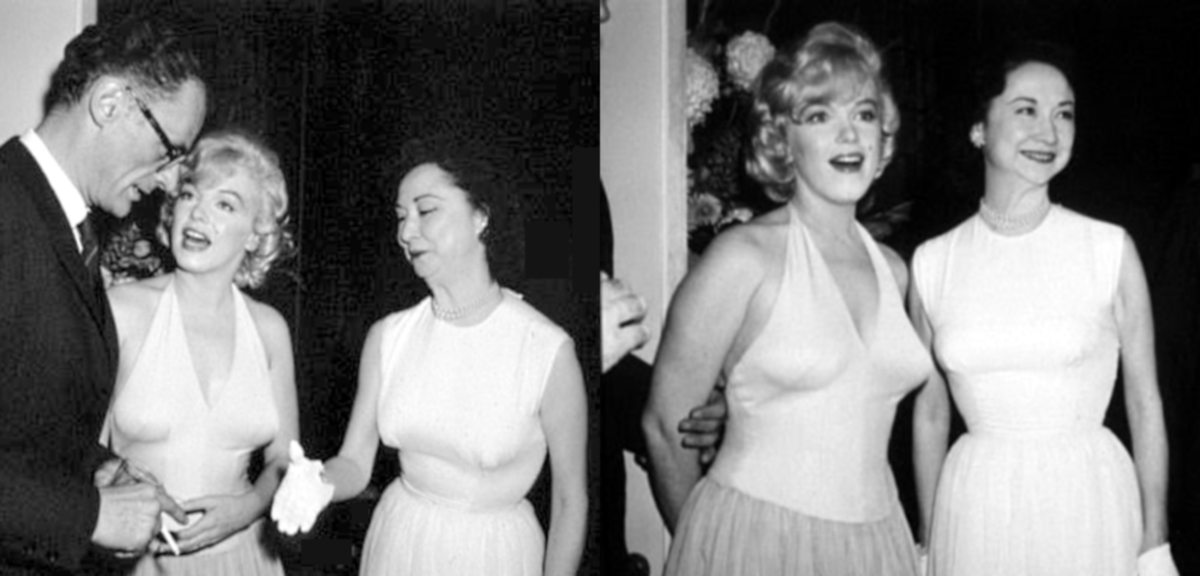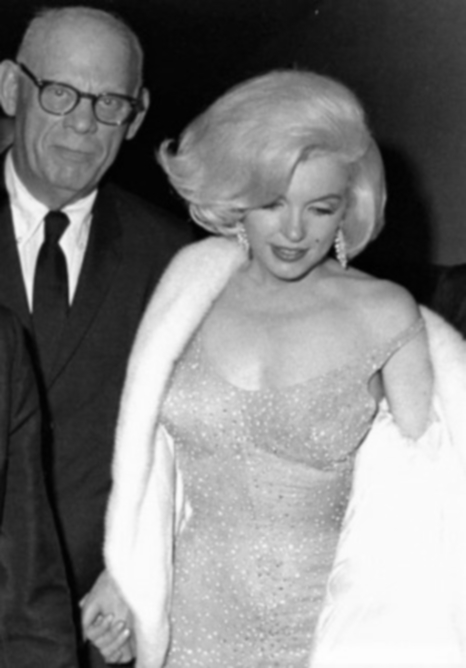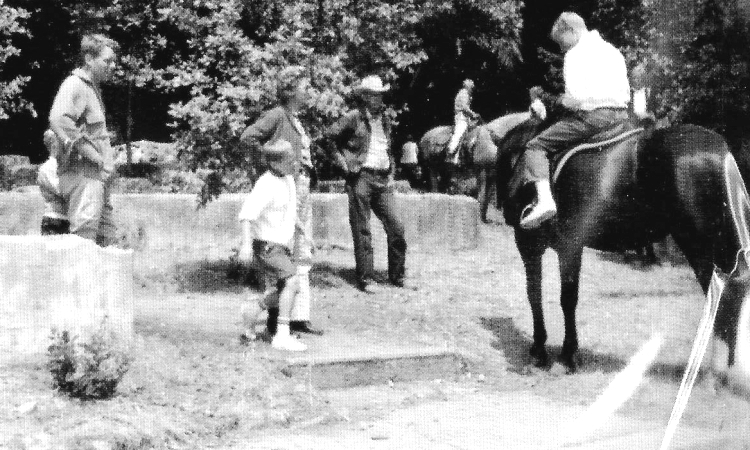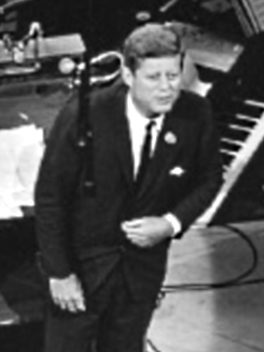A Fabricated Friendship
An important foundational premise posited by Shaw in Collateral Damage is that some type of lengthy and abiding friendship existed between the movie star and the gossip columnist. Kilgallen’s friends, Shaw asserted, included stars from stage and screen like Marilyn (Shaw 51). Yet, the author did not offer any tangible evidence to conclusively establish this putative friendship.
Sixty-eight pages following the preceding assertion, Shaw introduced a woman named Brenda DeJourdan, the daughter of Dorothy Kilgallen’s deceased butler, James Clement. Evidently Shaw interviewed Brenda; but the author’s source notes did not reveal anything about the interview or his source, a glaring but typical omission.
Brenda informed Shaw that Dorothy often hosted fabulous parties. Presumably following one of those many parties, Brenda’s father assisted Marilyn to her car because she was intoxicated (Shaw 120). In Shaw’s opinion, that statement cemented that the two famous women were friends, certainly a quantum leap considering that Brenda’s testimony was not very specific. Was the referenced car Marilyn’s personal car or a rented limousine? And if not a limousine, why would Dorothy allow a her intoxicated friend to drive on the streets of Manhattan? Certainly the gossip columnist would have instructed her butler to call or hail a taxi cab for her good friend. Furthermore, Brenda did not assert that she actually witnessed her father assisting the intoxicated actress. Did the butler’s daughter simply recall a story that her father had related to her? A significant difference; and since we do not know the calendar date when this party occurred, judging Brenda’s statement becomes even more difficult. Then Shaw made an interesting comment: Dorothy would have had to approve Marilyn’s party invitation (Shaw 120). Why? If Dorothy and Marilyn were such great pals, why didn’t Dorothy just give her actress pal a jingle and invite her? At any rate, other than Brenda DeJourdan’s anecdotal testimony, flimsy at best, possibly even hear-say, Shaw did not offer any additional evidence pertaining to the purported friendship between the two famous women.
Oddly enough, Shaw himself actually undermined his friendship premise. He admitted that Dorothy occasionally fired potshots at Marilyn, but usually in jest (Shaw 94). Shaw also noted: Dorothy once compared Marilyn’s appearance to an unmade bed (Shaw 95). I’m not exactly sure how Shaw knew, or could even assert, that Dorothy fired her pot-shots at Marilyn simply for comic effect. He certainly could not have interviewed her. Still, it must be noted that Marilyn did not take insults of any type, particularly those regarding her appearance, lightly or in her stride.
Then, remarkably enough, Shaw contradicted his assertion that Dorothy took potshots at Marilyn and declared: Kilgallen always spoke highly of Marilyn (Shaw 422). Really? Then he quoted a 1955 Playboy interview with the writer, Truman Capote, during which Capote shared an anecdote involving Marilyn, a NYC saloon and his friend, Dorothy Kilgallen. Allegedly as Capote and Marilyn neared the saloon, he suggested that they duck inside and re-fresh themselves. It’s full of advertising creeps, Marilyn responded according to Capote. Then she added: And that bitch Dorothy Kilgallen, she’s always in there getting bombed. Even as Capote tried to defend his journalist friend, according to him, Marilyn commented that Dorothy had written some bitchy stuff about me (Shaw 422). Shaw soft-pedaled Marilyn’s comments, called them merely misgivings about Dorothy; but Marilyn’s comments do not sound like mere misgivings: they sound like well founded and hostile dislike. Therefore, in view of the preceding, what exactly are the facts about any relationship shared by Marilyn Monroe and Dorothy Kilgallen? The unvarnished truth.
Of course, since Dorothy was an important member of the press, Marilyn was obligated to associate with the gossip columnist; and she evidently did so, but only to a point. Dorothy often published unsubstantiated and false gossip about Marilyn which the actress neither understood nor appreciated. Even Shaw noted that many press agents considered Dorothy to be a “sucker” for an unsubstantiated story about a personality and thus didn’t do her homework to confirm a story’s validity before it appeared in her gossip column (Shaw 127); and that troubling fact leads me directly to Robert Slatzer.
Dorothy apparently knew Slatzer; and she mentioned him in one of her columns as a dark horse in the Marilyn Monroe romance derby. Slatzer, Dorothy asserted, was a generous soul who gave Marilyn books, her most favorite gift. Unquestionably, Slatzer fed Dorothy that morsel of gossip. Additionally, during Dorothy’s vacation in 1952, Slatzer wrote her gossip column, which he proceeded to use as a forum to begin his literary fraud and construct his fantasy relationship with and marriage to the famous actress.
Marilyn researcher and blogger, April VeVea, noted on her blog site, Unraveling the Slander of Marilyn Monroe, that Dorothy often displayed animosity toward Marilyn for no apparent reason; and the gossip columnist frequently reported on Marilyn’s romances, alleging that the blonde actress was involved romantically with many men. Even so, actress and gossip columnist evidently enjoyed a fair relationship until 1953 when Marilyn ceased giving Dorothy exclusives. It must be noted: Marilyn would immediately forsake persons who had spoken indiscreetly about her private life, persons who had criticized her or persons who she felt had betrayed her. Such must have been the case with Dorothy Kilgallen and her gossip column. Certainly, then, after 1953, Marilyn considered Dorothy unworthy of her trust.
April VeVea also noted: Dorothy Kilgallen and Walter Winchell were the only two journalists who did not receive an invitation to the 1955 event during which Marilyn announced the formation of Marilyn Monroe Productions; and Marilyn biographer, Donald Spoto, also noted: Every Manhattan columnist and every reporter of any status was present except Dorothy Kilgallen and Walter Winchell, both of whom had been excluded by Milton [Greene] because of their general hostility toward Marilyn (Spoto 303); and finally, Dorothy did not receive an invitation to attend Marilyn’s funeral while Walter Winchell did: he was Joe DiMaggio’s friend.
In an email communication with me regarding the Marilyn–Dorothy friendship alleged by Shaw, Marilyn biographer, Gary Vitacco-Robles, noted that he was only aware of DK attending the event to promote the romantic comedy, Let’s Make Love, released in September of 1960. Extant photographs depict Marilyn, her costar, Yves Montand, and Arthur Miller with Dorothy Kilgallen; but an unbiased and forthright analysis of those photographs will lead to this conclusion: while Marilyn and Dorothy were together during that publicity event, they were not being friendly. In fact, Marilyn appeared to be completely disinterested in Dorothy’s presence, as the photographs below reveal.

Gary also commented: I wouldn’t consider them [Marilyn and Dorothy] good friends. As a member of the press, MM had no choice but to cooperate with DK. There is no known personal correspondence between them. Gary offered to search Marilyn’s address books for Dorothy’s name; but even Shaw admitted that the journalist’s name did not appear therein, an important omission that Shaw did not explain. Being absent from Marilyn’s books of important names, addresses and telephone numbers meant that she did not consider the missing person an important part of her life, and worse still, she did not consider the missing person a friend.
Did Marilyn know Dorothy Kilgallen? Of course. But were they good friends or even friends at all? No evidence exists that would lead a reasonable person to conclude that Marilyn and Dorothy Kilgallen were even friends, much less good friends. In fact the actual evidence suggests just the opposite: Marilyn and Dorothy were not friends.


